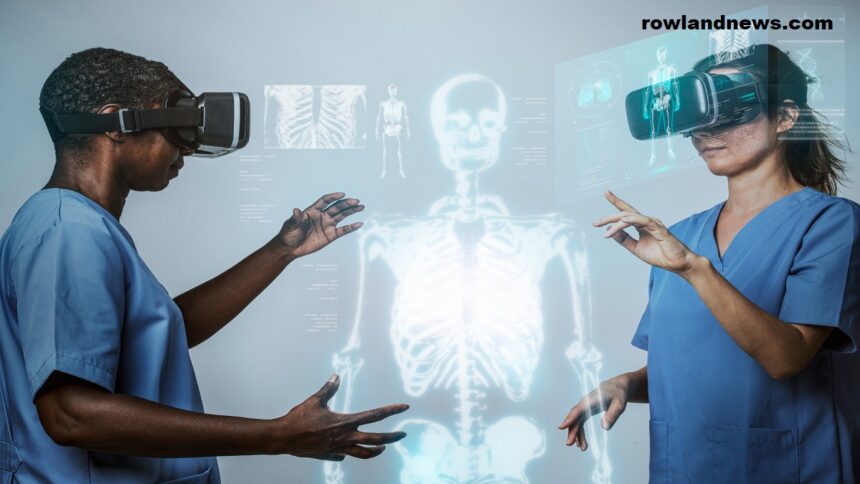Introduction: The Future of Healthcare
Picture yourself entering the doors of a hospital to find that in addition to doctors and nurses who greet you, there’s even an artificial intelligence (AI) to help diagnose your condition, advise treatments tailored just for you and predict how successful your recovery will be. That sounds like science fiction? Well, today this very future is now swiftly becoming reality before our very eyes.
AI-powered healthcare is revolutionizing the entire healthcare industry, propelling it to new heights of efficiency, precision, and transparency. In this blog, we will examine how artificial intelligence systems have transformed diagnostics and treatment in healthcare worldwide since their initial deployments.
What Is AI-Powered Healthcare?
AI-powered healthcare is the integration of artificial intelligence technologies with medical systems, enabling them to perform various functions, ranging from aiding in diagnosis to designing personalized treatment plans. These new production tools utilize big data, machine learning technologies, and automate administrative tasks in healthcare delivery.
AI in healthcare can process vast amounts of data, such as medical records, test results, or even genetic information, orders of magnitude faster and more accurately than any human ever could. This capability is transforming how medical professionals diagnose diseases, plan treatments, and forecast outcomes.
Transformations in Diagnostics through AI
Early Detection of Disease
Artificial intelligence can determine diseases at an even earlier stage than doctors. An example is in medical imaging, AI is now almost perfect at reading things like X-rays, CT scans, and MRIs.
AI has demonstrated itself to be just as effective, and often more so, than human radiologists in detecting conditions such as lung cancer, breast cancer, and heart disease.
A proverbial success case of AI is the use in analyzing mammograms. Some research suggests that digestion with AI, as opposed to traditional methods, can detect and locate breast cancer earlier and more accurately. It reduces false positives and improves breast cancer detection.
Precision Medicine
AI can help doctors tailor treatments for each patient using its genomic background, medical history, and lifestyle instead of going by the one-size-fits-all approach. This is particularly important in diseases such as cancer, where different treatments can work better for one patient than another depending on their genetic makeup.
IBM Watson Health is an example of a platform enabling precision medicine by analyzing data from clinical trials and journals to help oncologists choose treatments that match a patient’s genetic profile. This shift supports the development of personalized medicine across healthcare systems.
Read Also: The Impact of AI on Data Privacy and Security in 2025
AI in Treatment: Tailored Healing for Better Outcomes
AI-Assisted Surgery
AI-assisted surgery is enhancing precision in the OR. Robotic surgery, aided by AI, has enabled surgeons to perform highly accurate, minimally invasive procedures.
The da Vinci Surgical System is a great example, using AI-driven robotic arms to support complex operations. The result is faster recovery, fewer complications, and better patient outcomes.
Virtual Health Assistants
Imagine having an AI assistant tracking your health and providing medical advice. That’s what virtual health assistants aim to do. These systems monitor vital signs, remind patients to take medication, and offer suggestions on healthy living.
Ada Health, for example, is an AI-powered healthcare app that evaluates symptoms and helps users understand possible causes, delivering health tracking directly to users before they even visit a doctor.
Predictive Analytics for Better Outcomes
Predictive analytics is used to anticipate and improve future health outcomes. By analyzing health data, AI can forecast the likelihood of certain diseases, enabling early disease detection and proactive care.
AI also helps reduce hospital readmission by identifying at-risk patients. This benefits both care providers and public health systems by reducing the burden and enhancing healthcare outcomes.
Examples of AI in Healthcare in the Real World
Google Health’s AI for Eye Disease
Google Health has created an AI tool that examines eye scans for early signs of diabetic retinopathy and other vision-related conditions. Its precision sometimes surpasses that of human specialists.
Babylon Health and the NHS
Babylon Health, in partnership with the NHS, offers a digital health service where AI evaluates symptoms and offers healthcare advice via mobile. It’s transforming primary care in the UK.
PathAI for Pathology
PathAI uses machine learning to read pathology slides with higher accuracy than traditional methods. Its ability to reduce misdiagnoses makes it a cornerstone of healthcare innovation.
Challenges and Concerns for AI in Healthcare
While powerful, AI technology in healthcare faces obstacles. Data privacy is a chief concern; sensitive medical data must be protected with top-tier data security protocols.
There’s also algorithmic bias: if AI systems are trained on skewed data, they may deliver inaccurate results. This is a primary ethical consideration in healthcare technology and needs careful oversight.
The Path Forward for AI in Healthcare
AI is becoming embedded in medicine, from early detection and diagnosis to treatment and monitoring. Yet progress must balance. The benefits of AI-powered healthcare are vast, but systems must remain ethical, equitable, and secure.
As we move deeper into the future of healthcare, the role of AI technology in healthcare transformation will continue to grow. The systems we adopt today shape how we live and thrive tomorrow.
Call to Action
Curious about the future of healthcare? Stay informed through resources like Forbes Healthcare Innovation and MIT Technology Review. For reliable updates, check trusted institutions like UCLA Health Sciences.
AI-powered healthcare is already here. From diagnostics to treatment, it’s transforming how we live, heal, and thrive, just as indispensable as clean water was for generations before.
